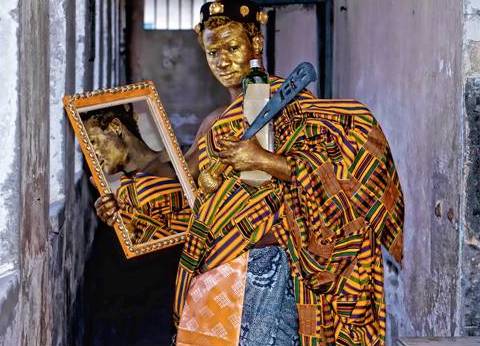Volksbühne, Berlin, Germany
28 Feb 2015

© Bernard Akoi-Jackson, Die abgebildete Arbeit des Künstlers Bernard Akoi-Jackson heißt Goldman
In 2015 the Berlin Africa Conference has its 130th anniversary. At the invitation of the Reich Chancellor Bismarck, representatives of European states, the US and the Ottoman Empire held a meeting from November 1884 to February 1885, and – in the absence of African representatives – completed the partition of Africa into colonies with the so-called General Act.
Initiated as early as the 16th century with the main aim of enslavement trade, the occupation of primarily the coastal strips which also included the participation of Brandenburg-Prussia now resulted in an almost complete annexation and exploitation of the continent. From then on, Germany – seconded by the military with so-called protection forces – claimed colonies in East and West Africa including territories in present-day Togo, Cameroon, Namibia, Tanzania, Burundi, and Ruanda. The borders determined in the Reich Chancellery – situated between Potsdamer Platz and Brandenburg Gate – at the time and in the following years on the drawing boards of the Europeans, are valid to the present day. The Berlinisation of a continent, the mass murder of indigenous populations in Africa, committed also by Germans (e.g. the genocide of the Herero and Nama in Namibia or during the Maji Maji War in Tanzania), not only marks the prelude to the genocides of the 20th century. To this day and beyond the independence of the African countries, the decisions taken in the colonial metropolis Berlin continue to have an effect; for instance in form of the absorption of local resources and manpower by transatlantic corporations, often within the framework of political association treaties. Among other things, considering the refugees dying in their thousands in the Mediterranean and in front of the border of prosperity, the self-image currently cultivated in Germany’s capital, of being the moral and political pacemaker of the Fortress Europe and its periphery, is ambiguous. Is it the ‘White Saviour’ shining through like a ghostlike revenant of the past in the ‘German Empire’ which is obviously becoming stronger by the minute? On 28 February 2015, the Volksbühne at Rosa-Luxemburg-Platz provides all of its theatre space to attempt an artistic-academic approximation to Germany’s implication in colonialism.
participants include: Kwesi Aikins, Bernard Akoi-Jackson, Martin Baer, Andrew Botelle, Nikolaj Cyon, Christian Etongo, FOKN Bois, Zoe Hagen, Sulaiman Masomi, Philip Metz, Fatima Moumouni, Wanjiku Mwaurah, Prince Kum´a Ndumbe III., Markus Öhrn, Göran Hugo Olsson, Rosa Amelia Plumelle-Uribe, Benedict Koyo Quaya aka Sir Black, Laza Razanajatovo, Temye Tesfu, Jürgen Zimmerer
Saturday 28 February 2015
Talks, Installations, Performances, Films, Poetry Slam, Concert
Schedule (preliminary):
Kassenhalle (cashier hall) / Parkettfoyer (seating area foyer) / Sternfoyer
3 pm – midnight:
– Sculpture by Philip Metz “Le herós invisible” in front of the Volksbühne portal and installation by Philip Metz “Adler Afrika” in the cashier hall
– Filmloop: directed by Martin Baer, “Befreien Sie Afrika!” in the seating area foyer
from 4 pm : CAMEROONIAN CUISINE inclufing “Mafé”, “Alokos”, “Makalas” in the Sternfoyer, prepared by Marilou Eken
Großes Haus (Main House)
4 pm Talk: Rosa Amelia Plumelle-Uribe “From the Extermination of Non-Whites to the Extermination of Non-Aryans” (in French with simultaneous translation)
4.30 pm Film premiere: directed by Laza Razanajatovo: “Fasa”
4.45 pm Talk: Prince Kum’ a Ndumbe III. “Macht, Ausbeutung, Neugestaltung des internationalen Kräfteverhältnisses und die Gefährdung des Weltfriedens” (“Power, Exploitation, Restructuring of the International Balance of Power and the Threat to World Peace”; in German)
5.30 pm Panel Discussion with Prince Kum‘ a Ndumbe III., Rosa Amelia Plumelle-Uribe, Jürgen Zimmerer, hosted by Kwesi Aikins: “De|Berlinisierung und De|Kolonisierung Afrikas und Europas in der Kolonialmetropole Berlin” (“De|Berlinisation and De|Colonisation of Africa and Europe in the Colonial Metropolis Berlin”; German and French with simultaneous translation)
7.15 pm Film Preview: directed by Andrew Botelle “Waterberg to Waterberg – In the Footsteps of Samuel Maharero” (62min)
8.30 pm Spoken Word with Zoe Hagen, Sulaiman Masomi, Fatima Moumouni, Wanjiku Mwaurah, Benedict Koyo Quaya aka Sir Black, Temye Tesfu; hosted by: Wolf Hogekamp and Julian Heun: “An African and German Poetry Slam Show”
10 pm Concert: FOKN Bois
Hinterbühne (Back Stage)
4.15 pm Film: directed by Jean Marie Téno “Das koloniale Missverständnis” (75min)
6 pm Performance by Bernard Akoi-Jackson “Walking[s], Staging[s] [an] eventual Sharing[s]”
6.30 pm Film: directed by Martin Baer “Kopfjagd” (44min); followed by a discussion with the director
8 pm Film: directed by Göran Hugo Olsson “Concerning Violence” (85min)
3rd Floor Installation
4 pm / 6 pm / 8 pm Film installation Markus Öhrn “Bergman in Uganda”
Roter Salon
7 pm Forum Memorial March
10 pm Performance by Christian Etongo “After Tears”
11.30 pm Party with FOKN Bois DJs
In solidarity we call attention to the 9th memorial march in memory of the African victims of the enslavement trade, enslavement, colonialism and racist violence which will take place on 28 February 2015 from 11 am. A forum of the memorial march will take place in the Roter Salon.
Tickets for the complete Africa Conference cost 13,- Euros and 11,- Euros (reduced).
Co-curators: Sebastian Kaiser, Bernard Akoi-Jackson
Academic concept and general consultation: Kwesi Aikins
Film: Alexandra Engel, Michael Busch
Music: Christian Morin
Dramaturgy: Thilo Fischer
Assistance: Julian von Hammerstein
Funded by Fonds TURN of the German Federal Cultural Foundation and with the support of Goethe-Institutes in Ghana and Cameroon as well as the Swedish Embassy. In cooperation with AfricAvenir e.V., Foundation For Contemporary Art Ghana and Rencontres du Film Court Madagascar